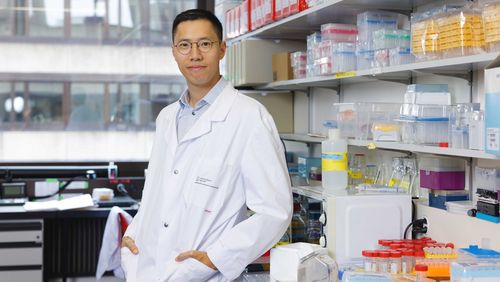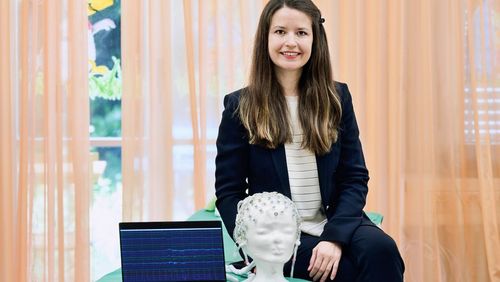
7 obstacles on the path to success
Cell biologist Gabriele Gut is developing technology to optimise cancer treatments and has plans to establish a spin-off company. Thanks to a MedTechEntrepreneur Fellowship sponsored by the Werner Siemens Foundation, he has the funding to pursue his goal—a company that provides personalised therapies for people living with cancer. Will his venture take off? The following seven points are usually decisive for the success of young entrepreneurs.

1. Idea
Every successful start-up company begins with a brilliant idea, and Gabriele Gut has not come up short: he has developed a technology that increases the success rate of cancer treatments. Now as ever, cancer remains one of the most common causes of death, and finding the right therapy continues to be difficult. Not only does the disease take on innumerable forms, but patients also respond differently to the various medicines available. Gabriele Gut, however, has found a way to improve treatment selection: he cultivates tumour cells of the cancer patient in the lab and tests how these respond to around 60 different medications. An algorithm then determines the ideal combination of medication for a personalised therapy.
2. Money
The Werner Siemens Foundation is supporting Gabriele Gut’s idea with 150 000 Swiss francs in seed capital. “Without this support, I doubt I would have proceeded,” says Gut. Now, for the next 18 months, he is guaranteed the necessary conditions to further develop his idea; the funding will cover his salary as well as materials required for product development. Gut is currently seeking additional sponsors to cover the cost of establishing his laboratory—an expensive undertaking.


3. Coaching
For years, Gabriele Gut has been able to rely on the feedback and advice of Lucas Pelkman, his superior and mentor at the University of Zurich. Coaching is, however, necessary not only in research, but also in business matters such as strategic, financial and regulatory issues. All recipients of the MedTech-Entrepreneur Fellowship are required to attend special business courses, but these do not feel like an obligation to Gut: “So much is still so new to me. I’m grateful for the support.”

4. Infrastructure
“These toys don’t exactly come cheap,” says Gabriele Gut pointing to several microscopes worth between 400 000 and one million Swiss francs each. Until he can afford his own laboratory, he will continue to work at the Institute of Molecular Life Sciences at the University of Zurich (Irchel Campus) and, in future, perhaps at the UZH Life Science Incubator Lab (Schlieren Campus), where all the necessary equipment has been installed.

5. Networking
“The number of emails from people who want to discuss my project has increased dramatically,” says Gabriele Gut. Gut is well aware that networking will be central to the success of his spin-off. “I’m dependent on the help and interest of others,” he says. In order to develop such relationships, personal contact is essential. And the first opportunities are already available: the instructors of the Fellowship courses are all experts with start-up experience or a background in biotechnology.

6. Industry
If there is one thing Gabriele Gut has already learned, it is that communicating with business representatives is totally different to communicating with researchers. While he saves the “wow factor” for the end when presenting for academics, he is sure to open with it for a business audience: “I completely reverse the order of my presentations,” he says, “otherwise they’re out the door.” The initial feedback from industry is positive says Gut, “but nothing is confirmed yet”.

7. Work-Life-Balance
Days in the laboratory are often long. “If an experiment takes 12 hours, well, then it takes 12 hours,” says Gabriele Gut. The long days make breaks all the more important. In his everyday life, cooking distracts him and makes room for other thoughts. But to fully switch off, the 28-year-old prefers multi-day hikes—far from Switzerland and without mobile devices. Recently, he travelled to Tajikistan with his partner; the couple loaded their hiking packs with a tent, sleeping bags, gas cooker and food—and set out. “A week cut off from the world is as relaxing for me as three weeks at the beach.”
Text: Andres Eberhard
Photos: Felix Wey







